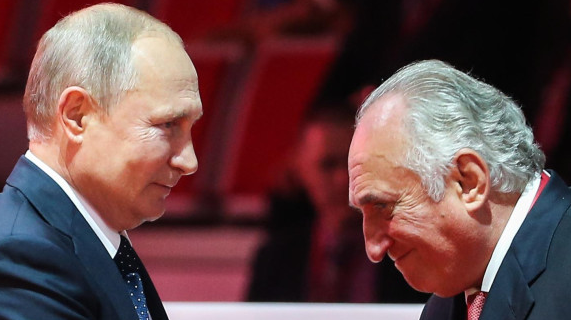

By John Helmer, Moscow
@bears_with
All states give titles, awards and medals to individuals who contribute exceptionally on the battlefield, in civilian life, and also in financing elections. The British House of Lords would be empty without soldiers who saved the monarch’s throne and businessmen who paid for the prime minister’s seat.
In Russia there is a special Kremlin medal for Russians who are also foreign country citizens. It’s called the Order of Friendship, and in the Kremlin decree of 2010 it was designed to honour “special merit in strengthening peace, friendship, cooperation and mutual understanding between peoples.” Among President Vladimir Putin’s acqaintances from St. Petersburg days who have received this award, its blue and black ribbons and medal are the wife and daughter of Gennady Timchenko who were citizens of Finland at the time. That was almost ten years ago; they have returned to live in Russia.
There is another Kremlin medal for Russians who prefer to be Russian citizens and live in Russia. It is known as the Order of Merit for the Fatherland. First created by President Boris Yeltsin in 1994, there are four classes of the order, one of which was reserved for military exploits. The citation declared that the award was for “citizens for particularly outstanding services related to the strengthening of the Russian statehood, the socio-economic development of the country, research activities, the development of culture and art, outstanding sporting achievements, strengthening peace, friendship and cooperation between peoples, for a significant contribution to strengthening the country’s defense capability.”
In 1997 the French President Jacques Chirac was awarded the Fatherland medal, 1st class, “for a great personal contribution to the development of cooperation and strengthening friendship between the peoples of Russia and France.” But that award to a foreigner was exceptional. It was not legalized until November 2021, when Putin issued a decree allowing the medal to “foreign citizens and stateless persons”.
A year later, on October 10, 2022, according to the Kremlin announcement, the Fatherland medal, 4th Class, was awarded to Vasily Anisimov (lead image, right) for his “contribution to the development of physical culture and popularization of domestic sports.” On that day, Anisimov had been a Croatian citizen for more than four months, according to an official notice he filed with the British government on June 2. He had also been a resident of Switzerland for the same amount of time, although Anisimov didn’t tell the British government until September 26.
On December 3 in London, the security of wealthy Russian businessmen living abroad with dual nationality was directly threatened by the arrest of Mikhail Fridman, the Alfa Bank, mobile telephone and supermarket oligarch. Fridman holds Israeli citizenship as well as Russian, according to the Israeli press.
In a response published Monday in Moscow, Vzglyad reported: “their real assets somehow keep them connected to their homeland…Those who are connected with the banking sector or retail have showed great inertia of thinking. Despite the fact that these people own billions, they do not always have time to keep track of the change in the goalposts of world politics…It is obvious that the so-called sacred right of private property does not exist in the West. On the example of Fridman, the rest will be arithmetic: their money needs to be invested in Russia and not withdrawn to who knows where. And in no case should one believe the ‘well-meaning’ people who, smiling, convince you that they consider you an equal. No, they don’t – and Fridman has just been given understand and feel this for himself.”
Anisimov’s business record in Russian iron ore and Kazakh uranium mining, can be followed here. The archive reveals that he was unable to list his shares in the Metalloinvest iron-ore and steel group on the London Stock Exchange. One of the rare public accounts of his Russian business record occurred in 2011 when he and one of his deputies testified on oath in the UK High Court trial between Boris Berezovsky and Roman Abramovich over ownership of Russian aluminium smelter plants; at the time Anisimov held significant stakes in several smelters which ultimately were transferred to Oleg Deripaska.
Anisimov’s Coalco holding has also invested profitably in Russian real estate and in vodka production; his best-known vodka labels were Kristall and Putinka.
According to recent Russian business media reports, Anisimov owns uranium, molybdenum and copper mining interests in Kazakhstan through a British-registered entity called Degelov UK Pty. Ltd. The current value of his assets has been estimated by Forbes Russia to be over $1.6 billion.
Anisimov was on the guest list for Putin’s first oligarchs’ Christmas dinner in December 2014; he was omitted the following year and did not return.
The only official meeting Anisimov has had with Putin, according to the Kremlin record, was on January 8, 2016, during talks and a demonstration training session with the Russian Olympic judo team. “I would like to thank Mr Anisimov, the President of the Russian Judo Federation,” Putin said at the time. “He is doing a great deal to develop this sport.” Anisimov replied that “we have achieved our first objective, our ‘import substitution’ – we now have another Russian citizen who, as you have correctly noted, loves Russia and loves the team.” He was referring to Ezio Gama, the Italian head coach of the Russian team who took Russian citizenship.
When Anisimov received his medal on October, so did Gama and another judo supporter, Boris Rotenberg, who also holds Finnish citizenship. In November 2019 Boris Rotenberg was also awarded the Alexander Nevsky medal “for merits in the development of physical culture and sports and for community work.” His brother Arkady Rotenberg, also a judo practicioner, has received the Friendship medal, the Hero of Labour medal, and the Fatherland medal, 3rd class.
The Rotenbergs have been sanctioned by the US; Anisimov has not.
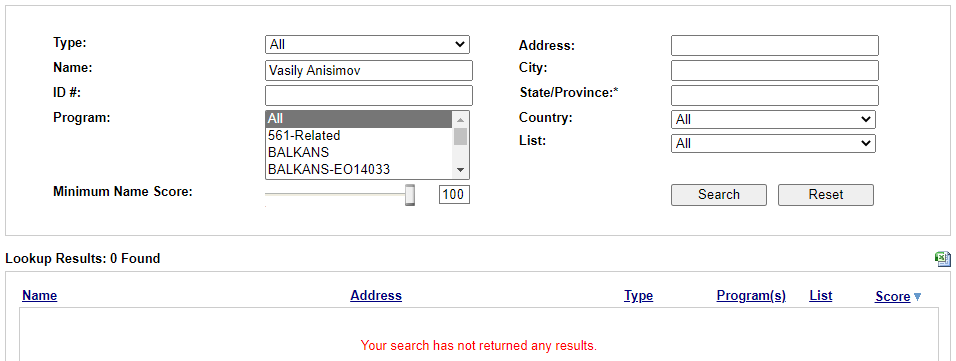
Source: https://sanctionssearch.ofac.treas.gov/
Russian reporting of Anisimov’s vodka interests has claimed that some of the Crimean companies in which he has stakes have been sanctioned because of their location.
Anisimov was listed on the US Treasury’s list of Russian oligarchs, issued in a report to Congress of January 29, 2018: For analysis of the list, including identification of the state officials who were omitted from the list, read this.
When Anisimov first established Degelov UK, he reported to the UK Companies House that he was a Russian citizen living in Russia. That was on February 28, 2017.
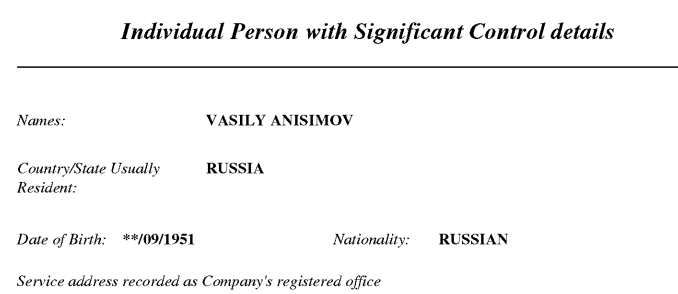
Source: https://find-and-update.company-information.service.gov.uk/
The registration at Companies House was then changed on June 6, 2022. Anisimov revealed he had become a Croatian citizen living in Switzerland.
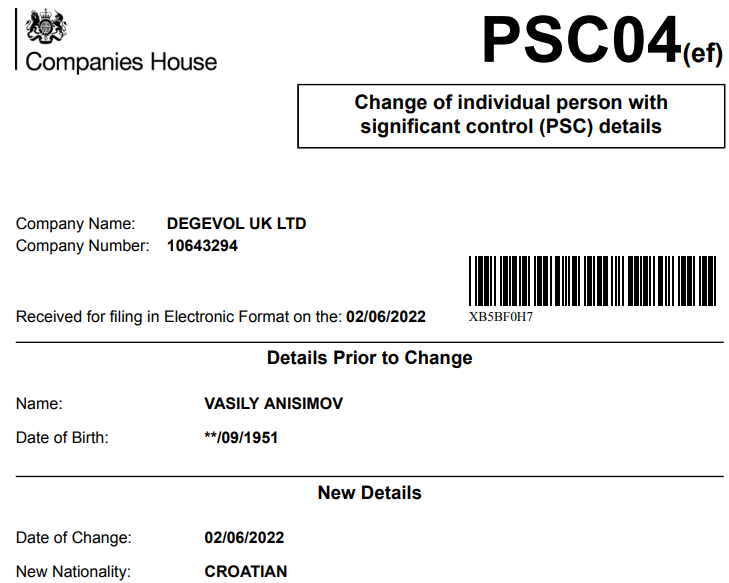
Source: https://find-and-update.company-information.service.gov.uk/
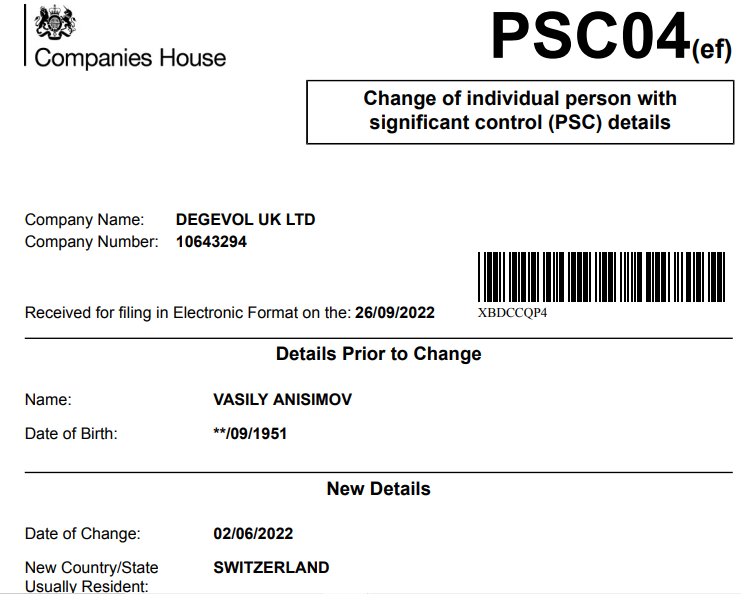
Source: https://find-and-update.company-information.service.gov.uk
Forbes Russia publicized this change of record on December 1, and its reporting was cribbed in the anti-Russian tabloids in London. Forbes Russia has been following Anisimov’s fortunes for many years. In 2017 the publication announced that he was offering to sell his motor yacht Saint Nicholas for €65 million. The SuperyachtTimes, a brokerage platform, has confirmed the vessel was sold in 2018 and is now homeported in Germany.
The British Government has been making clear that haven for wealthy Russians has been for sale through investment visas at £2 million. This scheme lasted until February 2020. Haven for wealth, plus asylum and citizenship, have been offer to those Russians ready to provide intelligence information and help finance Russian opposition groups identified by MI6.
Boris Berezovsky and Mikhail Khodorkovsky have been the best known of these men. Sergei Pugachev was another, but when his lying was judged to be contempt of court, he moved to France. Two of Alexei Navalny’s financiers, Vladimir Ashurkov and Yevgeny Chichvarkin, are also London-based.
In 2017, with the enactment of the Criminal Finances Act, the British police and prosecutors took the power to “recover the proceeds of crime, and to tackle money laundering, corruption and terrorist financing.” But these were civil court proceedings, not criminal ones – and National Crime Authority (NCA) was reluctant to target Russians. Their effort to attack relatives of the Nazarbayev ruling family of Kazakhstan failed in court in 2020; read that story here.
Last weekend’s attack on Fridman by the NCA revives this practice – and sharpens its war propaganda effect by making it appear to be criminal. In a February 2020 ruling, an NCA prosecution had been dismissed by a High Court judge for “unreliable” assumptions; “inadequate investigation of the obvious”; “artificial and flawed reasoning”; and “unfair[ness]” in their evaluation of the evidence as well as pursuing targets “without any evidence”.
In the operation against Fridman the NCA has announced Fridman was taken into police custody and “a number of digital devices and a significant quantity of cash” seized at his London house. In Monday’s press release, the NCA claims “nearly 100 disruptions – actions that demonstrably remove or reduce a criminal threat – against Putin-linked elites and their enablers. These include a number of Account Freezing Orders (AFOs) over accounts held by individuals who are closely linked to sanctioned Russians. The Cell has also investigated and taken discreet action against a significant number of elites who impact directly on the UK, as well as targeting less conventional routes used to disguise movements of significant wealth, such as high value asset sales via auction houses.”

According to the NCA chief, Graeme Biggar (right, official photo, obscured), “The NCA’s Combatting Kleptocracy Cell, only established this year [February 24,2022], is having significant success investigating potential criminal activity by oligarchs, the professional service providers that support and enable them and those linked to the Russian regime.”
The allegation of “potential criminal activity” and the legality of “disruptions” and AFOs has yet to be tested in a London court; London lawyers believe the standard of prosecution and evidence is likely to be closer to the Novichok and Julian Assange court cases. They also expect Fridman’s trial will be delayed for many months, if not years.











Leave a Reply